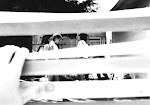Miss Barclay's is run by Miss Veda, a vague and cheerful woman of open Confederate sympathy. She owns three slaves -- Simon, her personal servant, Dalpha, the cook, and Sheba, Simon's daughter, whom she treats as a pet. Although the slaves are different from what Thetis expects, she observes that their presence casts a tension throughout the school.
Simon was a man to stay away from. His eye never fell on a person without making trouble for that individual -- girl or slave. Perpetual suspicion shone in his look. He wore an elaborate brass watch on a chain and when Miss Veda was not around he would sit in the armchair by the front door and hold it in front of him, eyes directly on it, as if time itself would not advance unless he personally supervised it. When it got dark he would say, bring me a candle, girl, and Sheba would reappear with a wax candle stuck at an angle on a broken bit of dish and set it down in front of him. There he would sit all night, I believe, his shoulders squared and his head at attention, as if he were listening, in some supernatural way, to the activities of the entire house. He rarely, if ever, spoke to anyone other than Miss Veda, and to her he used a special voice, deep and jovial, as he had at the breakfast table that first day. He did not speak in the Negro dialect, but he did lard everything he said with "ain't that right," and "you know it," nodding towards Miss Veda for affirmation. And she, in her turn, brought every mealtime pronouncement to him for approval, even if only in the form of a solemn nod, as if anything produced by a table full of women needed confirmation by a man.
Sheba was Simon's daughter, but he took no notice of her except when Miss Veda was around. She had her two beautiful dresses, along with shoes, wraps and gloves; everything was stiff and spotless as a doll's, and she could not stand to get anything on them. On rainy days she would stand on the doorstep and wring her hands like a temperance woman in front of a saloon, crying look at the rain, Miss Veda! look at all those people getting dirty! It was hard to tell her age. She was as tall as any of us, but she had a simple, scatterbrained appearance and was generally treated as if she were less than ten.
Thetis brings fleas from the Pittsburgh boarding house with her to Miss Barclay's. Even after this episode is forgotten, she remains a target of the other girls, tagged as an abolitionist (even though she has little idea what this means) and a Yankee.
"Were you scared last night? I was."
I laughed. "Polly thought it was the Rebs attacking."
"I did not!" Polly said.
"You did," I said promptly, "You said, 'It's the Rebs, isn't it?' and 'I was dreaming.'" I laughed again.
I wasn't trying to be rude. I liked Polly. I had heard the other girls make teasing comments like this to each other and shriek with laughter, without anyone's feelings being hurt. I didn't see why my comment couldn't be taken the same way.
"I never. You were more scared than I was, Thetis."
I didn't want to argue with Polly. But if they misremembered last night, my moment of glory would be forgotten.
"That was a good idea," I said flatly, in a voice that sounded fake to my own ears, "Asking me to recite last night, Polly."
Polly laughed.
"You did -- you asked me -- you said -- "
"I thought you just started talking out like that. I was going to tell you to be quiet."
"You did not!"
"Oh, Thetis, you're so..."
"...jealous," Jenny said.
I looked at them in disbelief.
"Jealous of what?"
"You're always pulling the other girls down and telling them they're wrong."
"Me?"
"You think you're better than us," Sarah said, gazing vacantly up at the sky as she leaned on the porch post. "And you're always chasing after us, trying to make us like you. And you make squeaking noises on the plate when you cut your meat."
"Sarah!" Ellen said.
"Typical Yankee," was Jenny's contribution. She leaned over toward the vegetable patch and made a flinging motion and suddenly one of those big hornworms that eat tomato plants landed on my arm. I froze. It began rippling up my skin, as long and thick as my finger and striped white and green. The sticky feeling of it attaching itself to me turned my stomach. Still, I did not move or scream. I reached over with my left hand, pulled it off, and, with it dangling between two fingers, marched around the side of the garden. The hornworm twisted and wiggled in mid-air, trying to grab hold of something. I hated it more than ever. The girls followed, at a distance. Polly squealed. I dropped it on a bare tomato plant and watched it inch away.
"What are you scared of? It's just a caterpillar," I said loudly.
It took me years to realize that I had done the worst thing possible. If I had screamed and had hysterics there might have been -- though probably not until much later -- a smidgen of sympathy, an eventual admission that it was a dirty trick, perhaps even a grudging apology from Jenny. Now I was clearly too crazy to be worth bothering about. Even Ellen turned away, sadly.
Subscribe to:
Post Comments (Atom)








No comments:
Post a Comment